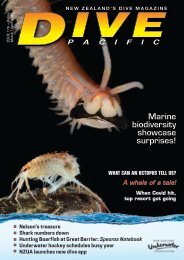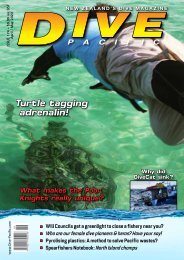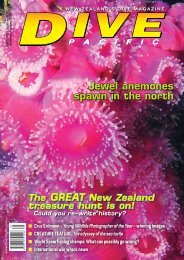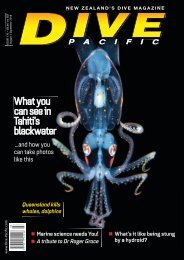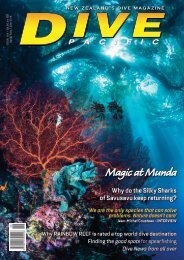Dive Pacific 175 Dec2020 Jan 2021
Dive Pacific, New Zealand's Dive Magazine , captures the best of diving in New Zealand and the Pacific. with adventures, top photos and expert technical advice
Dive Pacific, New Zealand's Dive Magazine , captures the best of diving in New Zealand and the Pacific. with adventures, top photos and expert technical advice
Create successful ePaper yourself
Turn your PDF publications into a flip-book with our unique Google optimized e-Paper software.
plunging up and down through the<br />
water column, they keep kicking<br />
phytoplankton back up to the<br />
surface, giving it more time to reproduce<br />
before it sinks into the abyss.<br />
Taking the eco system<br />
approach<br />
Today most of the large baleen<br />
whale populations are still greatly<br />
reduced in numbers compared to<br />
just 150 years ago. With less than<br />
7% of ocean wilderness protected,<br />
marine scientists are recognizing the<br />
importance of protecting complete<br />
marine ecosystems for keeping all of<br />
us healthy and our oceans thriving.<br />
With the new knowledge of trophic<br />
cascades, we can now begin to focus<br />
on ocean conservation and recovery<br />
efforts on an ecosystem-wide<br />
approach. We now know this is<br />
essential in maintaining the structure,<br />
function, and biodiversity of<br />
most natural oceanic ecosystems.<br />
We owe so much to the ocean. My<br />
own personal connection to the<br />
ocean started at a young age when<br />
…With the new knowledge of trophic cascades, we can now<br />
begin to focus on ocean conservation and recovery efforts on<br />
an ecosystem-wide approach… essential in maintaining the<br />
structure, function, and biodiversity of most natural oceanic<br />
ecosystems…<br />
my father strapped on my back his<br />
newly invented SCUBA equipment<br />
and allowed me to breathe underwater<br />
for the very first time. That<br />
was back in 1945, 75 years ago. Back<br />
then, the understanding of ecosystems,<br />
interconnection and trophic<br />
cascades was not well documented<br />
in the scientific literature. But since<br />
then, we have learned a tremendous<br />
amount about our interconnection<br />
and dependence on healthy, productive<br />
oceans. And there is no doubt,<br />
we still have much to learn, appreciate<br />
and protect.<br />
Our water planet,<br />
our only home<br />
This water planet is our only home,<br />
and we must do everything in<br />
our power to protect it, from the<br />
microscopic plankton to the giant<br />
whales whose numbers we hope will<br />
continue to recover and increase.<br />
When you protect the ocean, you<br />
protect yourself.<br />
Reaching lengths of close to 30.5 metres and weighting over<br />
150 tonnes, blue whales are the largest animal to have ever<br />
lived; larger than the largest dinosaur. They number over<br />
25,000 individuals today, making a slow and steady comeback<br />
after being hunted to near extinction less than 50 years ago.<br />
www.dive-pacific.com 19





